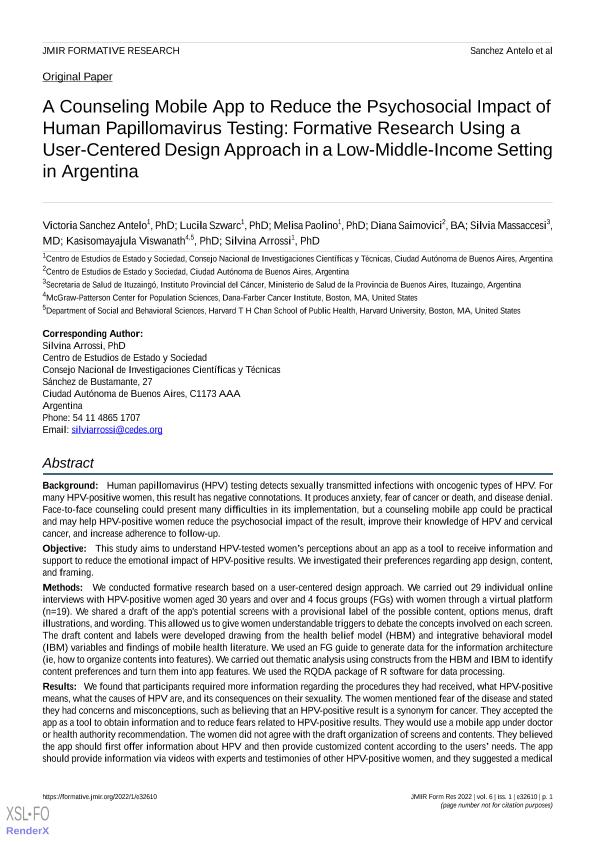Artículo
A Counseling Mobile App to Reduce the Psychosocial Impact of Human Papillomavirus Testing: Formative Research Using a User-Centered Design Approach in a Low-Middle-Income Setting in Argentina
Sánchez Antelo, Victoria Inés María ; Szwarc, Lucila
; Szwarc, Lucila ; Paolino, Melisa Delia
; Paolino, Melisa Delia ; Saimovici, Diana; Massaccesi, Silvia; Viswanath, Kasisomayajula; Arrossi, Silvina
; Saimovici, Diana; Massaccesi, Silvia; Viswanath, Kasisomayajula; Arrossi, Silvina
 ; Szwarc, Lucila
; Szwarc, Lucila ; Paolino, Melisa Delia
; Paolino, Melisa Delia ; Saimovici, Diana; Massaccesi, Silvia; Viswanath, Kasisomayajula; Arrossi, Silvina
; Saimovici, Diana; Massaccesi, Silvia; Viswanath, Kasisomayajula; Arrossi, Silvina
Fecha de publicación:
13/01/2022
Editorial:
Journal of medical Internet research formative research
Revista:
JMIR Formative Research
ISSN:
2561-326X
e-ISSN:
2561-326X
Idioma:
Inglés
Tipo de recurso:
Artículo publicado
Clasificación temática:
Resumen
Background: Human papillomavirus (HPV) testing detects sexually transmitted infections with oncogenic types of HPV. For many HPV-positive women, this result has negative connotations. It produces anxiety, fear of cancer or death, and disease denial. Face-to-face counseling could present many difficulties in its implementation, but a counseling mobile app could be practical and may help HPV-positive women reduce the psychosocial impact of the result, improve their knowledge of HPV and cervical cancer, and increase adherence to follow-up. Objective: This study aims to understand HPV-tested women’s perceptions about an app as a tool to receive information and support to reduce the emotional impact of HPV-positive results. We investigated their preferences regarding app design, content, and framing. Methods: We conducted formative research based on a user-centered design approach. We carried out 29 individual online interviews with HPV-positive women aged 30 years and over and 4 focus groups (FGs) with women through a virtual platform (n=19). We shared a draft of the app's potential screens with a provisional label of the possible content, options menus, draft illustrations, and wording. This allowed us to give women understandable triggers to debate the concepts involved on each screen. The draft content and labels were developed drawing from the health belief model (HBM) and integrative behavioral model (IBM) variables and findings of mobile health literature. We used an FG guide to generate data for the information architecture (ie, how to organize contents into features). We carried out thematic analysis using constructs from the HBM and IBM to identify content preferences and turn them into app features. We used the RQDA package of R software for data processing. Results: We found that participants required more information regarding the procedures they had received, what HPV-positive means, what the causes of HPV are, and its consequences on their sexuality. The women mentioned fear of the disease and stated they had concerns and misconceptions, such as believing that an HPV-positive result is a synonym for cancer. They accepted the app as a tool to obtain information and to reduce fears related to HPV-positive results. They would use a mobile app under doctor or health authority recommendation. The women did not agree with the draft organization of screens and contents. They believed the app should first offer information about HPV and then provide customized content according to the users’ needs. The app should provide information via videos with experts and testimonies of other HPV-positive women, and they suggested a medical appointment reminder feature. The app should also offer information through illustrations, or infographics, but not pictures or solely text. Conclusions: Providing information that meets women’s needs and counseling could be a method to reduce fears. A mobile app seems to be an acceptable and suitable tool to help HPV-positive women.
Archivos asociados
Licencia
Identificadores
Colecciones
Articulos(SEDE CENTRAL)
Articulos de SEDE CENTRAL
Articulos de SEDE CENTRAL
Citación
Sánchez Antelo, Victoria Inés María; Szwarc, Lucila; Paolino, Melisa Delia; Saimovici, Diana; Massaccesi, Silvia; et al.; A Counseling Mobile App to Reduce the Psychosocial Impact of Human Papillomavirus Testing: Formative Research Using a User-Centered Design Approach in a Low-Middle-Income Setting in Argentina; Journal of medical Internet research formative research; JMIR Formative Research; 6; 1; 13-1-2022; 1-18
Compartir
Altmétricas



